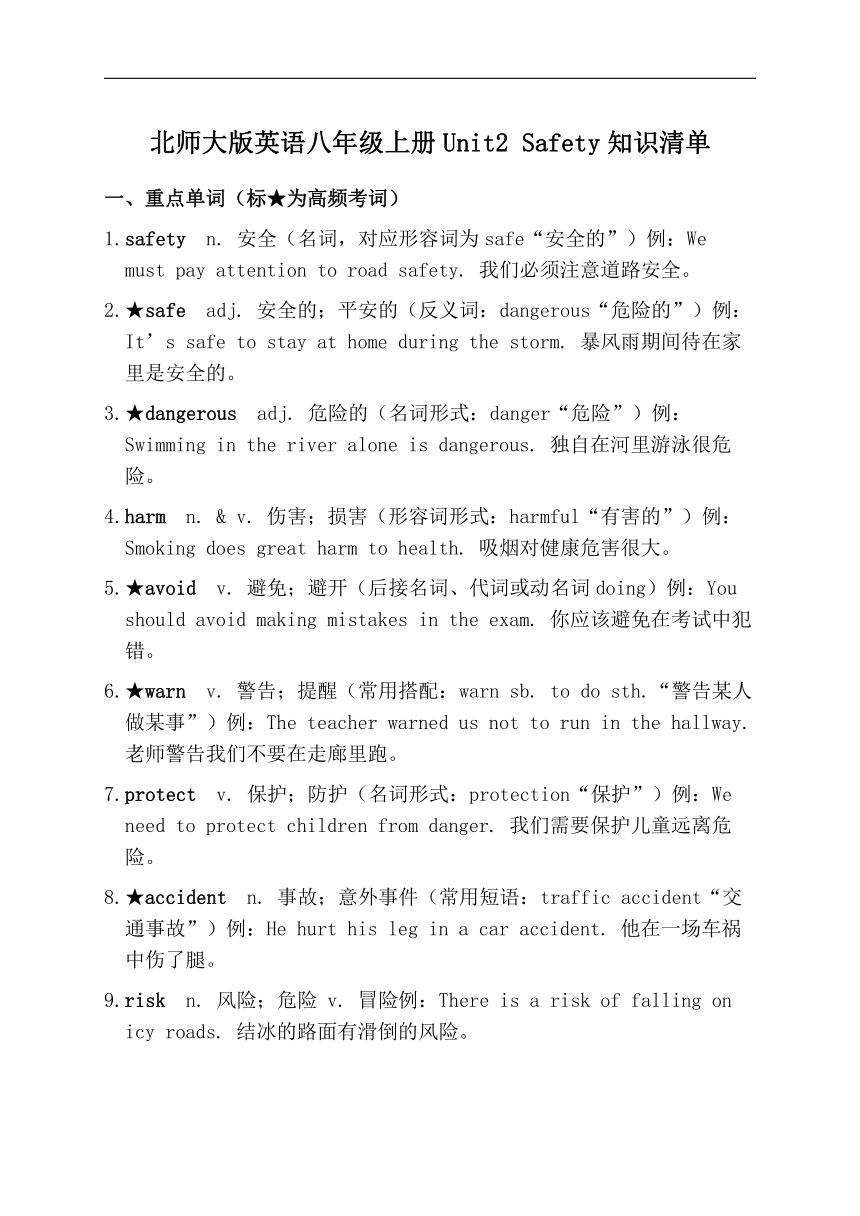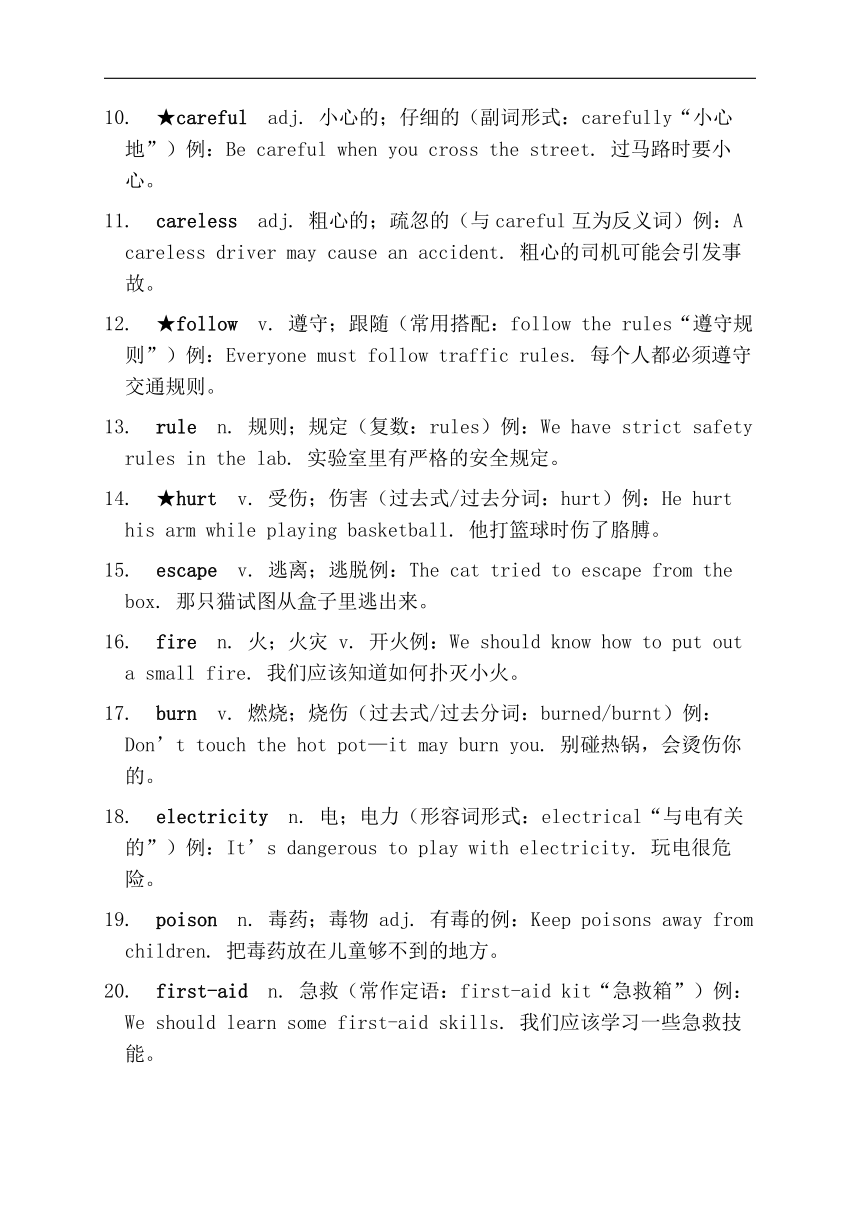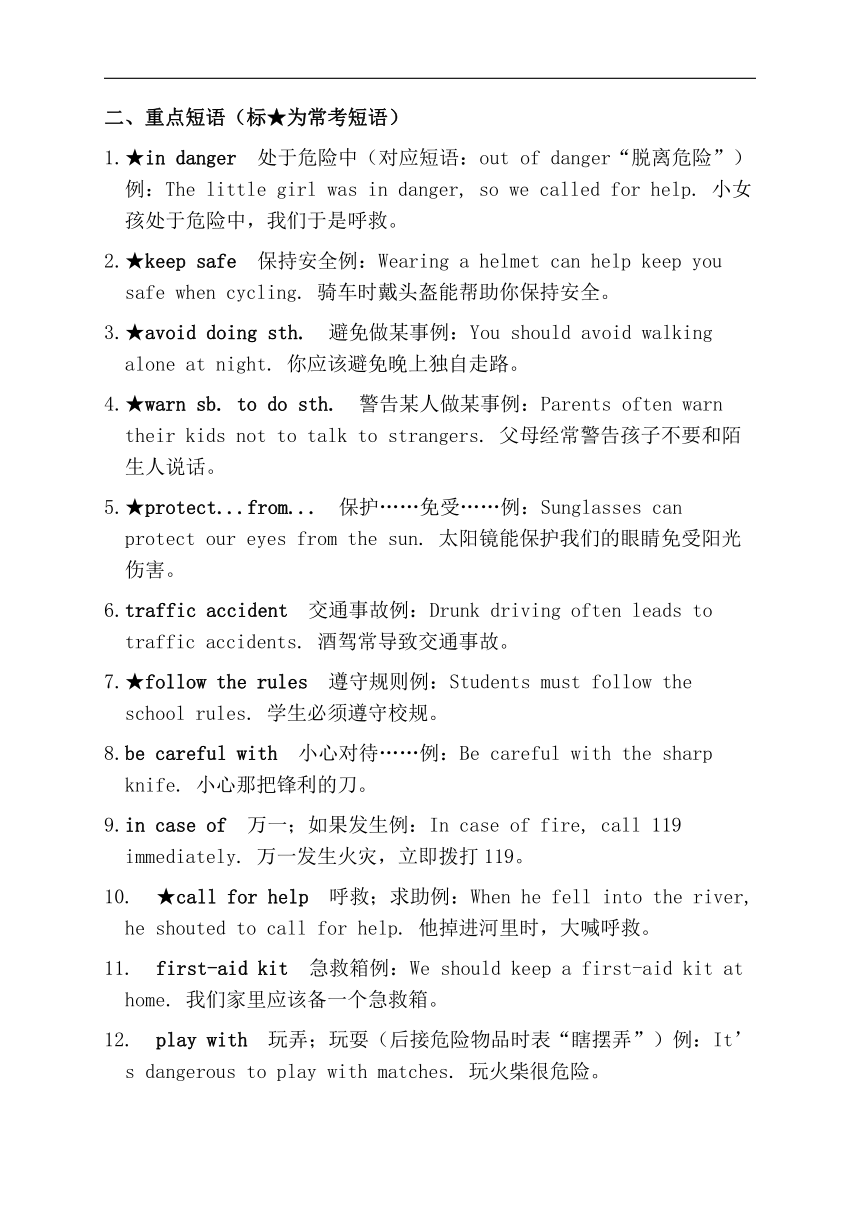Unit 2 Safety 知识清单2025-2026学年北师大版英语八年级上册
文档属性
| 名称 | Unit 2 Safety 知识清单2025-2026学年北师大版英语八年级上册 |  | |
| 格式 | docx | ||
| 文件大小 | 25.6KB | ||
| 资源类型 | 教案 | ||
| 版本资源 | 北师大版 | ||
| 科目 | 英语 | ||
| 更新时间 | 2025-08-02 16:15:39 | ||
图片预览



文档简介
北师大版英语八年级上册Unit2 Safety知识清单
一、重点单词(标★为高频考词)
safety n. 安全(名词,对应形容词为safe“安全的”)例:We must pay attention to road safety. 我们必须注意道路安全。
★safe adj. 安全的;平安的(反义词:dangerous“危险的”)例:It’s safe to stay at home during the storm. 暴风雨期间待在家里是安全的。
★dangerous adj. 危险的(名词形式:danger“危险”)例:Swimming in the river alone is dangerous. 独自在河里游泳很危险。
harm n. & v. 伤害;损害(形容词形式:harmful“有害的”)例:Smoking does great harm to health. 吸烟对健康危害很大。
★avoid v. 避免;避开(后接名词、代词或动名词doing)例:You should avoid making mistakes in the exam. 你应该避免在考试中犯错。
★warn v. 警告;提醒(常用搭配:warn sb. to do sth.“警告某人做某事”)例:The teacher warned us not to run in the hallway. 老师警告我们不要在走廊里跑。
protect v. 保护;防护(名词形式:protection“保护”)例:We need to protect children from danger. 我们需要保护儿童远离危险。
★accident n. 事故;意外事件(常用短语:traffic accident“交通事故”)例:He hurt his leg in a car accident. 他在一场车祸中伤了腿。
risk n. 风险;危险 v. 冒险例:There is a risk of falling on icy roads. 结冰的路面有滑倒的风险。
★careful adj. 小心的;仔细的(副词形式:carefully“小心地”)例:Be careful when you cross the street. 过马路时要小心。
careless adj. 粗心的;疏忽的(与careful互为反义词)例:A careless driver may cause an accident. 粗心的司机可能会引发事故。
★follow v. 遵守;跟随(常用搭配:follow the rules“遵守规则”)例:Everyone must follow traffic rules. 每个人都必须遵守交通规则。
rule n. 规则;规定(复数:rules)例:We have strict safety rules in the lab. 实验室里有严格的安全规定。
★hurt v. 受伤;伤害(过去式/过去分词:hurt)例:He hurt his arm while playing basketball. 他打篮球时伤了胳膊。
escape v. 逃离;逃脱例:The cat tried to escape from the box. 那只猫试图从盒子里逃出来。
fire n. 火;火灾 v. 开火例:We should know how to put out a small fire. 我们应该知道如何扑灭小火。
burn v. 燃烧;烧伤(过去式/过去分词:burned/burnt)例:Don’t touch the hot pot—it may burn you. 别碰热锅,会烫伤你的。
electricity n. 电;电力(形容词形式:electrical“与电有关的”)例:It’s dangerous to play with electricity. 玩电很危险。
poison n. 毒药;毒物 adj. 有毒的例:Keep poisons away from children. 把毒药放在儿童够不到的地方。
first-aid n. 急救(常作定语:first-aid kit“急救箱”)例:We should learn some first-aid skills. 我们应该学习一些急救技能。
二、重点短语(标★为常考短语)
★in danger 处于危险中(对应短语:out of danger“脱离危险”)例:The little girl was in danger, so we called for help. 小女孩处于危险中,我们于是呼救。
★keep safe 保持安全例:Wearing a helmet can help keep you safe when cycling. 骑车时戴头盔能帮助你保持安全。
★avoid doing sth. 避免做某事例:You should avoid walking alone at night. 你应该避免晚上独自走路。
★warn sb. to do sth. 警告某人做某事例:Parents often warn their kids not to talk to strangers. 父母经常警告孩子不要和陌生人说话。
★protect...from... 保护……免受……例:Sunglasses can protect our eyes from the sun. 太阳镜能保护我们的眼睛免受阳光伤害。
traffic accident 交通事故例:Drunk driving often leads to traffic accidents. 酒驾常导致交通事故。
★follow the rules 遵守规则例:Students must follow the school rules. 学生必须遵守校规。
be careful with 小心对待……例:Be careful with the sharp knife. 小心那把锋利的刀。
in case of 万一;如果发生例:In case of fire, call 119 immediately. 万一发生火灾,立即拨打119。
★call for help 呼救;求助例:When he fell into the river, he shouted to call for help. 他掉进河里时,大喊呼救。
first-aid kit 急救箱例:We should keep a first-aid kit at home. 我们家里应该备一个急救箱。
play with 玩弄;玩耍(后接危险物品时表“瞎摆弄”)例:It’s dangerous to play with matches. 玩火柴很危险。
stay away from 远离……例:Children should stay away from busy roads. 孩子们应该远离繁忙的马路。
on fire 着火例:The house was on fire, and people ran out quickly. 房子着火了,人们迅速跑了出来。
break the rules 违反规则例:Anyone who breaks the rules will be punished. 违反规则的人会受到惩罚。
三、重点句型(标★为核心句型)
★How can we keep safe 我们怎样才能保持安全?(用于询问安全措施,答语常用“主语 + should/must + 动词原形”
例:—How can we keep safe in the kitchen
我们在厨房怎样保持安全?
—We should be careful with hot water. 我们应该小心热水。
★It’s + adj. + to do sth. 做某事是……的。(it为形式主语,真正主语是后面的不定式to do sth.)
例:It’s important to learn about fire safety.
学习消防安全知识很重要。
★You should/shouldn’t do sth. 你应该/不应该做某事。(用于提出安全建议,should表“应该”,shouldn’t表“不应该”)
例:You should look left and right before crossing the road.
过马路前你应该左右看。
例:You shouldn’t swim in the deep river.
你不应该在深河里游泳。
★If you..., you will... 如果你……,你将会……(if引导条件状语从句,表“如果”,从句用一般现在时,主句用一般将来时)
例:If you run in the hallway, you may fall down.
如果你在走廊里跑,你可能会摔倒。
What should we do in case of... 万一……,我们应该做什么?(用于询问紧急情况的应对措施)
例:What should we do in case of an earthquake
万一发生地震,我们应该做什么?
Don’t forget to... 别忘了……(用于提醒注意安全细节)
例:Don’t forget to turn off the gas before leaving home.
离家前别忘了关掉煤气。
It’s dangerous to... 做……是危险的。(强调某行为的危险性)例:It’s dangerous to play with electrical sockets.
玩弄电源插座是危险的。
We mustn’t... 我们禁止……(mustn’t表“禁止”,语气比shouldn’t更强)
例:We mustn’t park here—it’s a fire exit.
我们禁止在这里停车,这是消防通道。
四、语法要点(标★为核心语法)
★情态动词should/shouldn’t的用法
含义:should表“应该”,用于提出建议或义务;shouldn’t表“不应该”,用于禁止或劝阻。
结构:
肯定句:主语 + should + 动词原形
例:We should wear seat belts in cars. 我们在车里应该系安全带。
否定句:主语 + shouldn’t + 动词原形例:You shouldn’t eat too much junk food. 你不应该吃太多垃圾食品。
疑问句:Should + 主语 + 动词原形?(用于征求建议)
例:—Should I tell my parents about the accident
我应该把事故告诉父母吗?
—Yes, you should. / No, you shouldn’t.
是的,你应该。/ 不,你不应该。
★if引导的条件状语从句
含义:if表“如果”,引导条件状语从句,说明主句动作发生的条件。
时态规则:“主将从现”(主句用一般将来时,从句用一般现在时)
例:If it rains tomorrow, we won’t have the sports meeting. (从句一般现在时,主句一般将来时)如果明天下雨,我们就不开运动会了。
其他用法:从句也可表客观事实,主句用一般现在时
例:If you heat ice, it turns into water. 如果你加热冰,它会变成水。
情态动词must/mustn’t的用法
must表“必须”,强调义务或强制要求(比should语气更强)
例:You must show your ID card to enter the building. 进入大楼你必须出示身份证。
mustn’t表“禁止”,意为“不允许”
例:You mustn’t smoke in public places. 你禁止在公共场所吸烟。
动名词作宾语(复习与拓展)
部分动词后接动名词(doing)作宾语,本单元重点动词:avoid, finish, practice, mind等
例:We should avoid making the same mistake. 我们应该避免犯同样的错误。
例:He finished reading the safety guide. 他读完了安全手册。
祈使句(用于安全警示)
肯定祈使句:动词原形开头(表“要求做某事”)
例:Wait for the green light. 等绿灯。
否定祈使句:Don’t + 动词原形(表“禁止做某事”)
例:Don’t touch the wire. 别碰电线。
一、重点单词(标★为高频考词)
safety n. 安全(名词,对应形容词为safe“安全的”)例:We must pay attention to road safety. 我们必须注意道路安全。
★safe adj. 安全的;平安的(反义词:dangerous“危险的”)例:It’s safe to stay at home during the storm. 暴风雨期间待在家里是安全的。
★dangerous adj. 危险的(名词形式:danger“危险”)例:Swimming in the river alone is dangerous. 独自在河里游泳很危险。
harm n. & v. 伤害;损害(形容词形式:harmful“有害的”)例:Smoking does great harm to health. 吸烟对健康危害很大。
★avoid v. 避免;避开(后接名词、代词或动名词doing)例:You should avoid making mistakes in the exam. 你应该避免在考试中犯错。
★warn v. 警告;提醒(常用搭配:warn sb. to do sth.“警告某人做某事”)例:The teacher warned us not to run in the hallway. 老师警告我们不要在走廊里跑。
protect v. 保护;防护(名词形式:protection“保护”)例:We need to protect children from danger. 我们需要保护儿童远离危险。
★accident n. 事故;意外事件(常用短语:traffic accident“交通事故”)例:He hurt his leg in a car accident. 他在一场车祸中伤了腿。
risk n. 风险;危险 v. 冒险例:There is a risk of falling on icy roads. 结冰的路面有滑倒的风险。
★careful adj. 小心的;仔细的(副词形式:carefully“小心地”)例:Be careful when you cross the street. 过马路时要小心。
careless adj. 粗心的;疏忽的(与careful互为反义词)例:A careless driver may cause an accident. 粗心的司机可能会引发事故。
★follow v. 遵守;跟随(常用搭配:follow the rules“遵守规则”)例:Everyone must follow traffic rules. 每个人都必须遵守交通规则。
rule n. 规则;规定(复数:rules)例:We have strict safety rules in the lab. 实验室里有严格的安全规定。
★hurt v. 受伤;伤害(过去式/过去分词:hurt)例:He hurt his arm while playing basketball. 他打篮球时伤了胳膊。
escape v. 逃离;逃脱例:The cat tried to escape from the box. 那只猫试图从盒子里逃出来。
fire n. 火;火灾 v. 开火例:We should know how to put out a small fire. 我们应该知道如何扑灭小火。
burn v. 燃烧;烧伤(过去式/过去分词:burned/burnt)例:Don’t touch the hot pot—it may burn you. 别碰热锅,会烫伤你的。
electricity n. 电;电力(形容词形式:electrical“与电有关的”)例:It’s dangerous to play with electricity. 玩电很危险。
poison n. 毒药;毒物 adj. 有毒的例:Keep poisons away from children. 把毒药放在儿童够不到的地方。
first-aid n. 急救(常作定语:first-aid kit“急救箱”)例:We should learn some first-aid skills. 我们应该学习一些急救技能。
二、重点短语(标★为常考短语)
★in danger 处于危险中(对应短语:out of danger“脱离危险”)例:The little girl was in danger, so we called for help. 小女孩处于危险中,我们于是呼救。
★keep safe 保持安全例:Wearing a helmet can help keep you safe when cycling. 骑车时戴头盔能帮助你保持安全。
★avoid doing sth. 避免做某事例:You should avoid walking alone at night. 你应该避免晚上独自走路。
★warn sb. to do sth. 警告某人做某事例:Parents often warn their kids not to talk to strangers. 父母经常警告孩子不要和陌生人说话。
★protect...from... 保护……免受……例:Sunglasses can protect our eyes from the sun. 太阳镜能保护我们的眼睛免受阳光伤害。
traffic accident 交通事故例:Drunk driving often leads to traffic accidents. 酒驾常导致交通事故。
★follow the rules 遵守规则例:Students must follow the school rules. 学生必须遵守校规。
be careful with 小心对待……例:Be careful with the sharp knife. 小心那把锋利的刀。
in case of 万一;如果发生例:In case of fire, call 119 immediately. 万一发生火灾,立即拨打119。
★call for help 呼救;求助例:When he fell into the river, he shouted to call for help. 他掉进河里时,大喊呼救。
first-aid kit 急救箱例:We should keep a first-aid kit at home. 我们家里应该备一个急救箱。
play with 玩弄;玩耍(后接危险物品时表“瞎摆弄”)例:It’s dangerous to play with matches. 玩火柴很危险。
stay away from 远离……例:Children should stay away from busy roads. 孩子们应该远离繁忙的马路。
on fire 着火例:The house was on fire, and people ran out quickly. 房子着火了,人们迅速跑了出来。
break the rules 违反规则例:Anyone who breaks the rules will be punished. 违反规则的人会受到惩罚。
三、重点句型(标★为核心句型)
★How can we keep safe 我们怎样才能保持安全?(用于询问安全措施,答语常用“主语 + should/must + 动词原形”
例:—How can we keep safe in the kitchen
我们在厨房怎样保持安全?
—We should be careful with hot water. 我们应该小心热水。
★It’s + adj. + to do sth. 做某事是……的。(it为形式主语,真正主语是后面的不定式to do sth.)
例:It’s important to learn about fire safety.
学习消防安全知识很重要。
★You should/shouldn’t do sth. 你应该/不应该做某事。(用于提出安全建议,should表“应该”,shouldn’t表“不应该”)
例:You should look left and right before crossing the road.
过马路前你应该左右看。
例:You shouldn’t swim in the deep river.
你不应该在深河里游泳。
★If you..., you will... 如果你……,你将会……(if引导条件状语从句,表“如果”,从句用一般现在时,主句用一般将来时)
例:If you run in the hallway, you may fall down.
如果你在走廊里跑,你可能会摔倒。
What should we do in case of... 万一……,我们应该做什么?(用于询问紧急情况的应对措施)
例:What should we do in case of an earthquake
万一发生地震,我们应该做什么?
Don’t forget to... 别忘了……(用于提醒注意安全细节)
例:Don’t forget to turn off the gas before leaving home.
离家前别忘了关掉煤气。
It’s dangerous to... 做……是危险的。(强调某行为的危险性)例:It’s dangerous to play with electrical sockets.
玩弄电源插座是危险的。
We mustn’t... 我们禁止……(mustn’t表“禁止”,语气比shouldn’t更强)
例:We mustn’t park here—it’s a fire exit.
我们禁止在这里停车,这是消防通道。
四、语法要点(标★为核心语法)
★情态动词should/shouldn’t的用法
含义:should表“应该”,用于提出建议或义务;shouldn’t表“不应该”,用于禁止或劝阻。
结构:
肯定句:主语 + should + 动词原形
例:We should wear seat belts in cars. 我们在车里应该系安全带。
否定句:主语 + shouldn’t + 动词原形例:You shouldn’t eat too much junk food. 你不应该吃太多垃圾食品。
疑问句:Should + 主语 + 动词原形?(用于征求建议)
例:—Should I tell my parents about the accident
我应该把事故告诉父母吗?
—Yes, you should. / No, you shouldn’t.
是的,你应该。/ 不,你不应该。
★if引导的条件状语从句
含义:if表“如果”,引导条件状语从句,说明主句动作发生的条件。
时态规则:“主将从现”(主句用一般将来时,从句用一般现在时)
例:If it rains tomorrow, we won’t have the sports meeting. (从句一般现在时,主句一般将来时)如果明天下雨,我们就不开运动会了。
其他用法:从句也可表客观事实,主句用一般现在时
例:If you heat ice, it turns into water. 如果你加热冰,它会变成水。
情态动词must/mustn’t的用法
must表“必须”,强调义务或强制要求(比should语气更强)
例:You must show your ID card to enter the building. 进入大楼你必须出示身份证。
mustn’t表“禁止”,意为“不允许”
例:You mustn’t smoke in public places. 你禁止在公共场所吸烟。
动名词作宾语(复习与拓展)
部分动词后接动名词(doing)作宾语,本单元重点动词:avoid, finish, practice, mind等
例:We should avoid making the same mistake. 我们应该避免犯同样的错误。
例:He finished reading the safety guide. 他读完了安全手册。
祈使句(用于安全警示)
肯定祈使句:动词原形开头(表“要求做某事”)
例:Wait for the green light. 等绿灯。
否定祈使句:Don’t + 动词原形(表“禁止做某事”)
例:Don’t touch the wire. 别碰电线。
同课章节目录
